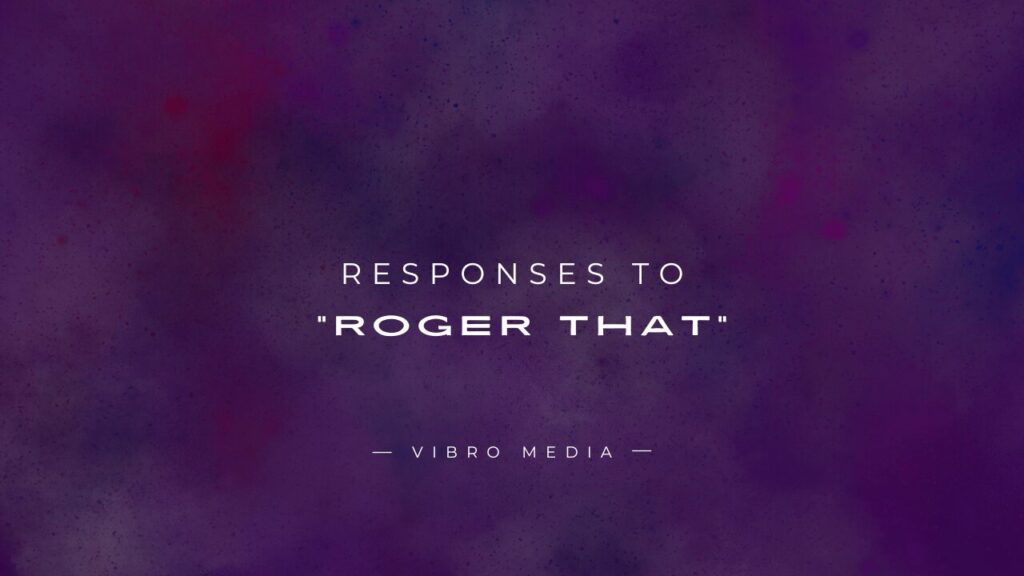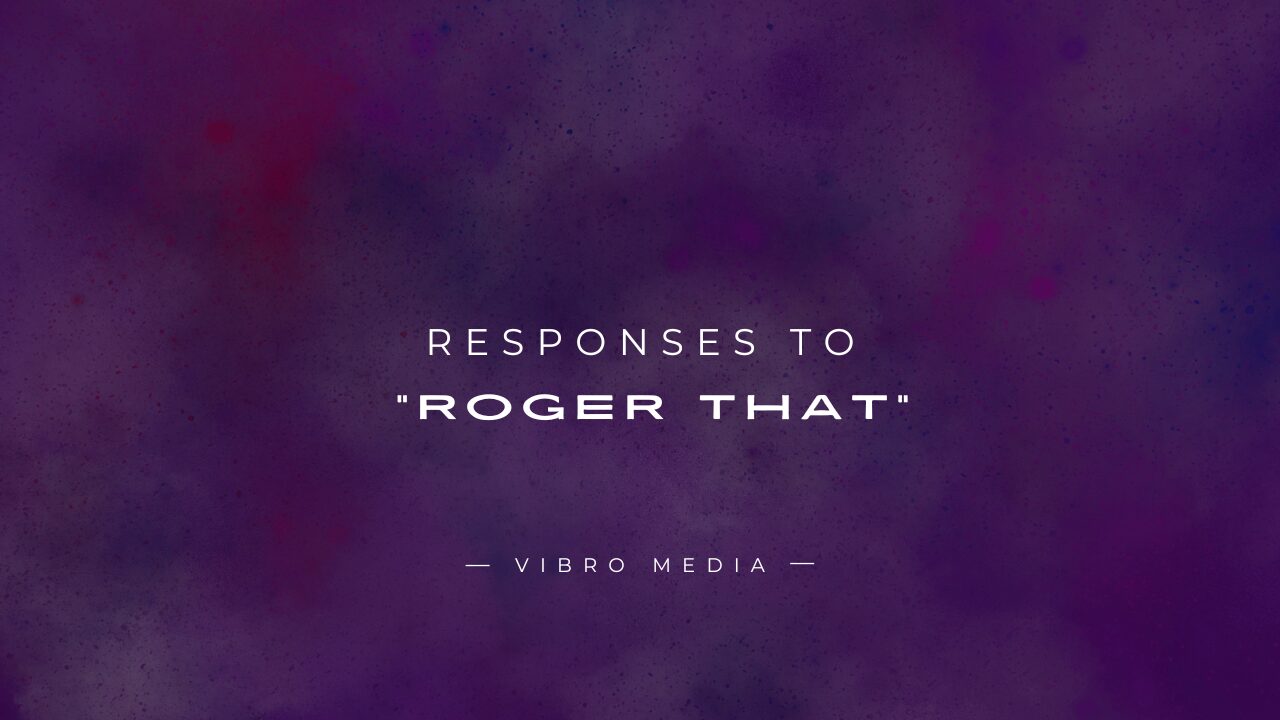Communication is about clarity, and phrases like “Roger That” are designed to ensure just that. Knowing how to respond can be handy if you hear this phrase for the first time or encounter it regularly. But what does “Roger That” mean, where did it come from, and how should you reply when someone says it? Let’s dive in and explore everything you need to know!

200+ Responses to “Roger That”
Formal Acknowledgment
- Noted and understood.
- I have received your instructions.
- Acknowledged, will act accordingly.
- Affirmative, I’ll proceed as directed.
- Confirmed, I will keep you updated.
- Message logged and confirmed.
- Your message is duly noted.
- I appreciate the confirmation.
- Understood, I’ll take it from here.
- Confirmed and acknowledged, thank you.
Casual or Friendly
- Sure thing, I’m on it!
- You got it, buddy!
- No worries, I’ll take care of it!
- Sounds good to me!
- Right on, I got this!
- You know it!
- Let’s do it!
- Cool, I’m all over that!
- Count me in!
- You bet I’ll handle it!
Humorous or Light-hearted
- Roger that, and I’ll throw in a donut!
- Loud and clear, Captain Crunch!
- 10-4, over and out!
- You got it, and I’m not even in uniform!
- Roger that! Beam me up, Scotty!
- Copy that! I’m on the case like Sherlock!
- Sure thing, let’s make this happen!
- Roger that, but can I get a raise?
- You got it! I’m your loyal minion!
- Copy that, but only if I get cookies!
Reassurance or Follow-up
- I’ll make sure it’s done promptly.
- Rest assured, I’m on top of it.
- I’ll check back in with updates.
- No need to worry; I’ve got this handled.
- I’ll keep an eye on it for you.
- I’ll handle it, don’t stress!
- I’ll confirm once it’s completed.
- You can count on me to follow through.
- I’ll update you as soon as I can.
- Trust me, I’ll make it happen.
Clarification or Inquiry
- To confirm, did you mean the deadline is tomorrow?
- What do you need me to prioritize?
- Roger that, what’s the next step?
- Can you elaborate on that for me?
- I understand, but could you clarify the details?
- Do you need a report on this?
- I got it, but could you explain further?
- Can you repeat that last part?
- Roger that, but do we have all the necessary resources?
- To be clear, are we talking about the same project?
Affirmative with Gratitude or Politeness
- Thanks for the update; much appreciated!
- I appreciate the guidance!
- Thank you for the confirmation!
- Thanks for keeping me in the loop!
- Grateful for your direction!
- I appreciate your help with this!
- Thanks, I’ll make it a priority!
- Thank you for the clarity; it helps!
- I’m thankful for your support!
- Thanks, I’ll ensure it’s handled well!
Dismissive or Nonchalant
- Sure, whatever.
- Yeah, okay.
- I got it.
- Fine by me.
- Alright, if you say so.
- Okay, let’s move on.
- Cool, no big deal.
- Sure thing.
- Sounds about right.
- If you say so.
Affirmative with Action (Military/Task-Oriented)
- Initiating the mission protocol now.
- Orders received; moving into action.
- We are executing orders immediately.
- Mobilizing resources as we speak.
- I am engaging Target on my way.
- We are commencing operations, over.
- We are firing up the engines now.
- All units are ready for deployment.
- The action plan is in motion.
- I am executing the directive now.
Slang or Modern Variations
- Bet!
- Say less.
- Facts!
- For sure!
- No cap!
- Gotcha, fam!
- All good!
- On it, no doubt!
- Aye, cool!
- Word!
Non-verbal or Abbreviated Responses
- 👍 (Thumbs-up emoji)
- K.
- Yep.
- 👌 (OK hand emoji)
- Sure.
- Yup.
- All set.
- Agreed.
- Roger.
- OK.
Sarcastic or Sassy
- Oh, really? I had no idea!
- Well, thanks for that!
- As if I had a choice.
- Sure thing, Captain Obvious.
- Got it! What’s next, Einstein?
- You don’t say!
- Sure, because I’m not busy at all.
- Roger that, I’m on the edge of my seat.
- Great, let me just drop everything.
- Sure, that’s just what I wanted to hear!
Affirmative with Enthusiasm or Excitement
- Absolutely! Let’s do it!
- Yes, sir! Excited to get started!
- On it! Can’t wait!
- You bet! Let’s make it happen!
- Awesome! I’m all in!
- Totally! This is going to be great!
- For sure! I’m pumped!
- Yes! Let’s roll with it!
- Heck yeah! I’m ready!
- Fantastic! Let’s get to work!
Technical or Jargon-Based
- Understood, executing per SOP.
- Data received; adjusting parameters.
- They were acknowledged and implemented the action plan.
- Processing now; check back for updates.
- She received the initiating protocol.
- Signal confirmed; we are going.
- Task acknowledged; executing workflow.
- Command logged; updating system.
- Ready for execution; all systems are operational.
- Message acknowledged; aligning with project specs.
Delegation or Passing On
- I’ll forward this to the team.
- I’ll pass your message along.
- Let me relay that to the others.
- I’ll inform the appropriate parties.
- I’ll make sure they’re updated.
- I am transmitting this to the relevant department.
- I’ll let them know right away.
- I’ll delegate this task accordingly.
- I’ll ensure the team is on board.
- I’ll share this with management.
Action-Based Confirmation
- I am already on it, starting now.
- Action is underway!
- Initiating the task as we speak.
- Confirmed, I’m making it happen.
- We are moving forward with the action plan.
- We are processing your request immediately.
- Action has been taken; I will follow up shortly.
- It’s in progress; I’ll keep you updated.
- Execution in motion, consider it done.
- On it! I’ll handle it from here.
Positive Reinforcement
- Great! That’s exactly what I needed.
- Perfect, I knew I could count on you!
- Awesome, keep up the good work!
- That’s fantastic; thanks for confirming!
- You’re doing an excellent job, thanks!
- Exactly! Appreciate your diligence!
- That’s the spirit! Thanks for being proactive!
- Well, I am done! Let’s keep this momentum going.
- I appreciate your hard work, thanks!
- You nailed it! Let’s keep it up!
Neutral or Indifferent
- Alright.
- Okay, that sounds good.
- Sure, that works.
- Fine.
- Understood.
- I got it.
- That’s cool.
- Sure thing.
- I see.
- Alright then.
Coded or Abbreviated Responses
- 10-4.
- Copy that over.
- Roger, wilco.
- QSL.
- Affirmative, RX received.
- C1.
- LZ is clear, moving in.
- Message received; all clear.
- Acknowledged, let’s proceed.
- Confirmed, initiating Q&D.
Empathic or Supportive
- I understand, and I’m here to help.
- You’re doing great; I appreciate your efforts.
- I’ll support you every step of the way.
- I hear you, and I’m on it.
- I’ve got your back on this!
- We’re in this together; I’ll handle it.
- I’m here for you; let’s tackle this.
- No worries, I’ll take care of it for you.
- You’re not alone in this; I’ll help.
- I understand the importance; I’ll prioritize it.
Acronym or Slang-Based Responses
- BRB is handling it.
- LOL, no problem!
- GTG, but I’ll get it done.
- I don’t know, but I’ll figure it out.
- FYI, we’re good to go!
- NP, I’ll take care of it.
- BFF, let’s do this!
- TMI, but I got it!
- IMO, we can nail this!
- TL;DR, it’s all set!
What Does “Roger That” Mean?
“Roger That” is a simple phrase to confirm that you’ve received and understood a message. It’s a term rooted in military and aviation communication, where clarity and precision are paramount. The phrase has become widely adopted outside these fields, even in everyday conversations.
Why Is It Used?
The phrase is commonly used because it’s a quick, easy way to acknowledge that you’ve heard what someone said. Whether you’re on a walkie-talkie or talking to a friend, saying “Roger That” signals that the message is clear and no further explanation is needed.
The Origins of “Roger That”
- Historical Background of the Phrase
The history of “Roger That” can be traced back to World War II when radio communication was widely used. Signal clarity wasn’t always the best back then, so certain words were used to avoid misunderstanding. “Roger” was chosen to represent the letter “R,” which stood for “received.” Essentially, it was shorthand for “I have received your message.”
- “Roger” in Aviation and Military Communication
In military and aviation communication, precision is key. “Roger” became an internationally recognized word to confirm that a message had been understood. Pilots, soldiers, and other professionals still use this term today as part of their protocol.
Understanding the Context of “Roger That”
- Common Situations Where You Hear “Roger That”
You’re most likely to hear “Roger That” in professional, technical, or casual conversations that require acknowledgment. It’s used on TV shows, military briefings, or even among friends during fun activities like gaming.
- Formal vs. Informal Contexts
While “Roger That” is professional in many situations, it can also be used informally. In a casual setting, you might say it after someone gives you simple instructions, like “Meet me at 6 p.m.” It serves a more serious purpose in formal environments, especially where clear communication is essential, such as in aviation or military contexts.
- Is It Appropriate for Everyday Conversations?
You bet! Although it has military roots, “Roger That” has become common. Just be mindful of the tone—while it works in casual settings, in more formal ones, you might want to stick with a more traditional “I understand.”
What Does It Mean When Someone Says “Roger That”?
When someone says “Roger That,” they confirm they’ve received and understood your message. It’s the equivalent of saying, “I hear you loud and clear.” Depending on the tone, it can be straightforward, sarcastic, or humorous.
- Interpreting the Meaning Behind the Phrase
While “Roger That” is generally neutral, be mindful of how it’s said. If it’s used with a flat or annoyed tone, it could indicate impatience or sarcasm.
- Assessing the Tone: Sarcastic or Sincere?
The tone is everything. A cheerful “Roger That” means the person is sincere, while a more monotone or exaggerated “Roger That” could indicate sarcasm.
Cultural Differences in Responding to “Roger That”
While “Roger That” is well-known in English-speaking countries, other cultures may have different phrases.
- International Understanding of the Phrase
In many countries, “Roger That” is understood due to the widespread influence of military movies and aviation. However, some languages have their equivalents.
- Phrases Similar to “Roger That” in Other Languages
For example, in French, a similar phrase might be “Reçu,” which means “received.” In Spanish, you might hear “Entendido,” meaning “understood.”
When Not to Use “Roger That”
In some situations, “Roger That” could be seen as too informal or inappropriate.
- Inappropriate Situations for This Phrase
For example, in very formal emails, legal documents, or in communication with senior professionals, using “Roger That” might seem too casual.
- Miscommunication Risks
The biggest risk is that “Roger That” might be misunderstood if the context isn’t clear or the person you’re speaking with is unfamiliar with the phrase.
The Importance of Tone and Context
As with any communication, how you say something is just as important as what you say.
- How Tone Affects Interpretation
If you’re too casual, “Roger That” might seem dismissive. If you’re overly formal, it might sound awkward. Finding the right balance is key.
- The Importance of Context in Responding Correctly
If you’re talking to someone professionally, stick to phrases like “Understood” or “Acknowledged.” In casual conversations, feel free to get more creative.
The Role of “Roger That” in Workplace Communication
Workplace communication often relies on quick acknowledgments.
- Using It in Emails and Text Messages
While “Roger That” can be used in emails or texts, it might be too casual for some workplaces. “Noted” or “Acknowledged” might be a better fit in those cases.
- Team Communication: Acknowledging Instructions
In team settings, acknowledging instructions is crucial. Whether using “Roger That” or another phrase, it’s important to let the sender know you’ve received the message.
Should You Use “Roger That” in Digital Communication?
In our tech-heavy world, digital communication is key. But is “Roger That” still relevant?
- The Relevance of the Phrase in Modern Tech
While “Roger That” originated in radio communication, it’s still used today, even in digital formats like Slack or email.
- Is It Suitable for Formal Emails and Messages?
In formal emails, it’s best to avoid “Roger That.” Stick with something more professional like “Understood” or “Acknowledged.”
Fun Facts About “Roger That”
Here’s something fun: Did you know “Roger That” is featured in countless movies and TV shows? The phrase has cemented its place in pop culture, from military dramas to space epics.
- Pop Culture References
Movies like Top Gun and Star Wars use “Roger That” to communicate clearly.
- Movies and TV Shows That Use the Phrase
You’ll also hear “Roger That” in shows like The Simpsons and Breaking Bad, where characters use it to add flair to conversations.
The Difference Between “Roger That” and Other Military Phrases
Plenty of military phrases are floating around, but “Roger That” holds its own.
- “Over and Out” vs. “Roger That”
While “Roger That” means “received,” “Over and Out” signals the end of communication.
- Similar Terms You Should Know
Other terms include “Wilco,” which means “will comply,” and “Affirmative,” meaning “yes.”
When It’s Best to Avoid “Roger That”
While versatile, “Roger That” isn’t always the right choice.
- Professional Situations Where It May Be Misinterpreted
“Roger That” can be seen as too informal in formal meetings or corporate emails.
- Alternatives in Corporate Settings
Use phrases like “Understood” or “Noted” instead.
Conclusion
In conclusion, mastering various responses to “Roger That” adds a fun and creative twist to your everyday conversations, whether you’re chatting casually with friends, participating in a team meeting, or just looking to spice up your vocabulary. With over 200 responses, you’ll always have clever comebacks. If you enjoyed this guide and want even more engaging conversation tips,
Check out our other post:
200+ Answers to “What Are Friends For?” You’ll Be Surprised
FAQs
Q. What does “Roger That” really mean?
“Roger That” means that you’ve received and understood the message.
Q. Is it rude to say “Roger That” in certain situations?
It depends on the context. In formal settings, it might be too casual.
Q. What are some humorous ways to reply to “Roger That”?
You can say, “Roger dodger,” “10-4,” or even, “Over and out!”
Q. Is “Roger That” still used in the military?
Yes, it’s still commonly used in both the military and aviation.
Q. Can you use “Roger That” in written communication?
It’s best used in casual or semi-formal writing but not in formal emails or documents.











I’m often to blogging and i really appreciate your content. The article has actually peaks my interest. I’m going to bookmark your web site and maintain checking for brand spanking new information.
naturally like your web site however you need to take a look at the spelling on several of your posts. A number of them are rife with spelling problems and I find it very bothersome to tell the truth on the other hand I will surely come again again.
Insanont Great information shared.. really enjoyed reading this post thank you author for sharing this post .. appreciated